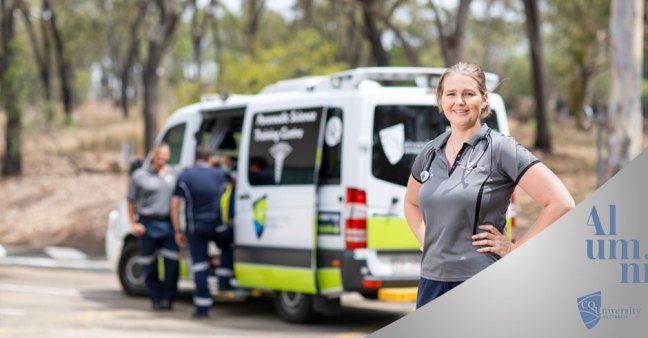Welcome to our update for paramedic alumni, where we share news and opportunities for our paramedic graduates.
If you would like to contribute ideas or be featured in our next edition, please contact us.
Thought leadership and Research in Paramedic Science
Hot topics in the news this year include pill testing and violence against paramedics, and CQUniversity Paramedic Science academics have been leading the conversation about these important issues.
Lecturer Ian de Jonge published this article, providing some useful tips for assessing when to seek help after taking a pill, and also outlines how Paramedics will treat people, hopefully helping people make a safe choice to seek medical help when needed.
Professor Brian Maguire is the author of five recent research articles that investigated the causes and potential solutions for the growing problem of violence against paramedics.
He recently presented to paramedics in Canada, leading to the Paramedic Chiefs of Canada issuing a ‘zero tolerance’ position about attacks on paramedics. View the webinar of Professor Maguire’s presentation.
He called for ambulance agencies across the globe to work with researchers to develop, implement and test interventions to reduce risk of violence against their personnel, in tandem with systematic reporting of both assaults and near-miss incidents and, importantly, publishing the results of trial interventions.
“Although many ambulance agencies have tried to reduce the risks of violence for their personnel, the outcomes of those attempts have not been tested and published,” Professor Maguire says.
“The important next steps are for ambulance agencies to work with university researchers to develop, implement, test and publish the findings of interventions to reduce the risks of violence and violence-related injury.
“In the meantime, paramedics can take it upon themselves to learn self-defence and to work with their partners to develop a plan for dealing with potentially violent situations.”
Professor Maguire is presenting in London on 29 May on the topic ‘Addressing the Threats of Violence and Injury Among Paramedics Internationally.’ View event details.
Live Simulations Contributing to Health Professional learning and Teaching
Nursing and Paramedic Science students recently participated in clinical scenarios and follow-up debriefs at the pointy end of a research project that has been developing for at least three years.
“Our research is leading towards safer outcomes for patients and health professionals,” says Tracey Simes, part of a CQUniversity research team monitoring the effectiveness of an innovative two-phase simulation debrief model.
Several students participated in a live scenario with a simulated patient involving an academic masked to play the role of an elderly fall patient who has suffered a traumatic head wound, drawing on resources from CQUniversity’s cutting-edge MASK-ED™ (KRS simulation) technology.
The real learning was not in the scenario participation but rather in the following debrief, as skills that students take with them into a workforce require effective clinical debriefing.
The first phase of the debrief focuses on feelings, communication, teamwork and personal obstacles that occurred. The second phase drills down to the thinking behind the action and treatment challenges faced, encouraging clinical reasoning.
“Each person’s learning is very, very individual so it’s about allowing that learning to evolve, because sometimes I think we direct it a little bit too much, and that is what we are wanting to research,” Ms Simes says. Researchers from CQUniversity’s School of Nursing, Midwifery and Social Sciences and School of Health, Medical and Applied Sciences will draw on findings from the clinical scenarios and debriefs to inform their project.
Students go global
CQUniversity Bachelor of Paramedic Science students Mathew Kennedy and Melissa Speed are headed across the world, enriching their student and leadership experience as part of the Global Voices Scholarship Program.
As part of the program, the students develop a policy paper with practical recommendations on a topic related to the delegation agenda.
Mathew Kennedy attended the Commission on the Status of Women in New York in March. Formerly a child safety officer in the remote Indigenous community of Palm Island, Mathew is passionate about improving outcomes for people regardless of their gender or ethnicity.
Mathew’s policy paper focused on the use of long-acting reversible contraception in addressing unintended adolescent pregnancy within Aboriginal and Torres Strait Islander communities. More on Mathew’s selection and policy paper.
Melissa Speed will attend the World Health Organisation’s World Health Assembly in Geneva, Switzerland in May, where she seeks to expand her knowledge on the intersection between foreign and domestic policies, health technology, and Australia’s major health priorities, and how we plan to address them.
Inspired by the recent heartache in her hometown of Emerald, Melissa’s individual policy paper - Mental Health and Suicide Prevention in Rural and Remote Australia - has a primary focus on young people. More on Melissa’s selection and policy paper.
Did you travel as part of your degree? We’d love to hear your story, and how it has helped you in your career.
